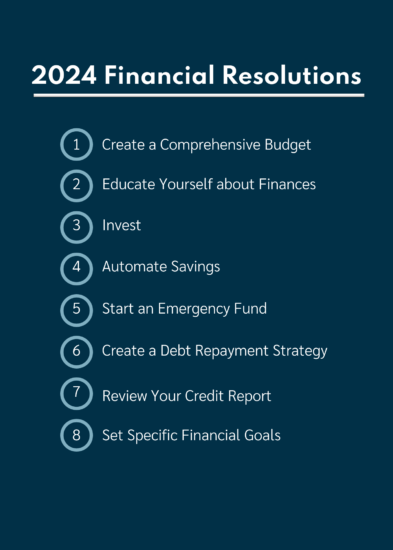Financial Resolutions for the New Year: Building a Stronger Financial Future in 2024

Written by: Samantha Masey, CFP®
As we say goodbye to last year and usher in 2024, it is the perfect time to reflect on our financial habits and set empowering resolutions for the future. This blog will provide actionable financial resolutions aimed at helping you create a solid foundation for your economic well-being in the coming year and beyond.
2024 Financial Resolutions
- Create a Comprehensive Budget
- Educate Yourself about Finances
- Invest
- Automate Savings
- Start an Emergency Fund
- Create a Debt Repayment Strategy
- Review Your Credit Report
- Set Specific Financial Goals
- Create a Comprehensive Budget
The first step towards financial freedom is understanding your household cash flow. There are a number of apps and tools that can help develop a detailed budget that encompasses all income and expenses, like Co-Pilot. Your bank may even offer a monthly analysis of your spending. Once you have established an accurate budget, it will be easier to implement meaningful financial strategies.
- Educate Yourself about Finances
In our ever-evolving financial landscape, knowledge is power. Information has never been more accessible with online resources, podcasts, books and other options available to us. Educating yourself not only empowers you to avoid financial pitfalls, but also sets an example for younger generations. Financial advisors are another beneficial resource that can provide guidance as you navigate financial situations.
- Invest
2024 can be the year to begin building your investment portfolio. Investing provides an opportunity for your wealth to accumulate at a higher rate of return than traditional savings accounts. Over the past 30 years, the stock market has returned an average of 10% while bonds returned between 5 and 6%. Traditional savings accounts have an average yield of .56%. Working with a financial advisor can help you align your investments with long-term financial goals.
- Automate Savings
Automating savings is one of the best ways to consistently work towards your financial goals. An easy way to implement this is to save a monthly predetermined amount to your savings account or emergency fund. Consider a high yielding savings account for these funds. Another beneficial strategy is automating contributions to your employer retirement plan. In general, you should contribute enough to receive any available employer match. However, a better recommendation is to contribute 10-15% of each paycheck. Starting now and saving often will have a major impact on your long term financial success.
- Start an Emergency Fund
The emergency fund rule of thumb is to save 3-6 months worth of expenses in a separate savings account. These funds will help with unforeseen expenses that can and will happen, and will help you from leveraging yourself unnecessarily.
- Create a Debt Repayment Strategy
Prioritizing debt repayment is a critical part of working towards financial health. Whether it is student loans, credit card debt, or other liabilities, you should begin by outlining a step-by-step approach to reduce and eventually eliminate outstanding balances. According to Experian, the average American in 2022 held $101,915 in debt. Last year’s average for student loans alone was $37,338 in federal student loans and $54,921 in private student loans.
An effective strategy is to tackle the debt with the highest interest rate first and work your way down from there. Additionally, remember to stay up to date with legislative changes and know your options. For example, there are student loan forgiveness and repayment plans you may qualify for. Learn more about student loan repayment options in Scott Strohecker’s recent blog.
- Review Your Credit Report
Fraud is only on the rise this year and staying vigilant has never been more important. There are several free resources available to review your credit score and help identify and address any discrepancies. Visit www.annualcreditreport.com to learn more.
- Set Specific Financial Goals
Lastly, take some time to outline your short term, medium term and long term financial goals. Research has shown that people who write down their goals are 42% more likely to achieve them than those who do not. Identifying goals adds clarity, encourages commitment, and serves as a constant reminder of priorities this year. Maybe you want to become more diligent about paying off your credit card debt in the short term or would like to begin saving for your child’s education in a 529 plan. There might be a home purchase in the midterm that you plan to use some of your Roth IRA funds or need to contribute to your brokerage account to save up for. Setting specific goals allows you to properly identify the financial strategies or investment vehicles necessary to help you achieve it.

Implementing these 8 financial resolutions will put you on the path towards lasting financial success. If you have any questions about these topics and would like to speak with a financial advisor, you can contact our team for more information.
Bouchey Financial Group has offices in Saratoga Springs and Historic Downtown Troy, NY as well as Boston, MA and Jupiter, FL.